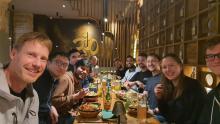The society for the promotion of our institute was founded in 2017 to maintain a regular exchange with the scientists at our institute beyond the time at the Reiche Zeche. After numerous upheavals, such as the appointment of a new Chair of Energy Process Engineering and the reorientation of the Chair of Numerical Thermofluid Dynamics towards the Modelling of Thermochemical Conversion Processes, and not least after the restrictions o the Covid pandemic, we would like to breathe new life into the Circle of Friends. We know that our former scientists put their heart and soul into their work and were very committed to science, technology and the community at the IEC. Many personal contacts and friendships have remained.
We now want to maintain this connection as part of the Circle of Friends and "take you along to the Reiche Zeche" from time to time using various media.
We hope that the following highlights will give you some insights into how the institute and the individual professorships have developed and aim to develop in the future.
Highlights of 2025
In the following PDF file you will find the highlights of the year 2025:
Activities of the entire institute
IEC trip to Leipzig - full of mysteries and glimpses behind the scenes
We recently spent a day together in Leipzig - an adventurous excursion with lots of experiences, new impressions and time to exchange ideas!
We started with an outdoor escape game through Leipzig's city center - an adventurous challenge that required creativity and teamwork.
We then took part in an excursion to the MDR studios and gained exciting insights behind the scenes of the media world.
A short stop at Thomas Church provided a nice spot for a group photo and a brief moment of reflection before we ended the day with dinner together at Apels Garten restaurant.
A successful day that gave us new impressions, valuable conversations and great shared memories.
Professorship for Energy Process Engineering
Innovator of the year 2024!
Our DeCarTrans joint project has been named “Innovator of the Year 2024” for the production of synthetic petrol from green methanol! The DeCarTrans project has so far produced more than 176,500 liters of sustainable gasoline in test campaigns.
Organization of the International Freiberg Conference
The conference focused on the use of biogenic waste. Current developments on the path to an efficient, circular carbon and hydrogen economy will be presented in Prague in September 2025.
First experiments with PlaSter and PQR
Together with players from the waste management, chemical and energy industries, we are working on new processes for plasma-assisted waste recycling. In the new research building “Zentrum für effiziente Hochtemperatur-Stoffwandlung” (ZeHS), IEC plasma-assisted test facilities are operated for the coupling of electricity into energy-intensive high-temperature processes. In the Plasma Steam Gasifier (PlaSter), a 65 kW water vapor arc plasma is used in fixed-bed operation. Initial tests with anode graphite and homogeneous types of plastic were carried out successfully and low-CO2 synthesis gas was produced. A 6 kW microwave plasma burner is also used in a tubular reactor. Further tests include the introduction of liquid hydrocarbons to simulate tar and oil-containing process gases and their targeted gas purification and upgrading.
Chair of Reaction Engineering
- Excursions with students and staff to Wacker Nünchritz (silicon and silicone/siloxane production), SKW Stickstoffwerke Piesteritz (NH3 synthesis and downstream products) and Total-Raffinerie Leuna
- Organization of the Syngas Ferrum (SynFe-24) conference on the fundamentals and applications of CO2 methanation and Fischer-Tropsch synthesis on Fe catalysts
- Start of the SAB project OptiSAF in cooperation with the Fraunhofer Institute IKTS Dresden for catalyst development and optimization of the value chain of CO/CO2-based Fischer-Tropsch to aviation fuels (kerosene)
- Organization of the consortium meetings of the research networks DeCarTrans, REF4FU and EwOPro, which focus on the synthesis of sustainable liquid fuels (gasoline, kerosene, diesel)
- Construction and commissioning of a further laboratory facility for olefin oligomerization into liquid fuels, in particular sustainable kerosene
- Start of an IGF project in cooperation with TU Darmstadt to understand the ageing of three-way catalysts and expansion of the laboratory facility to investigate three-way catalysts under permanent lambda variation
- Research on Fe-based catalysts for NH3 combustion to produce NO (Ostwald process for nitric acid production)
Professorship Modelling of thermochemical conversion processes
Process modeling in non-ferrous metallurgy
In two new research projects, we are working with partners from industry to develop technical concepts for converting existing recycling processes to the use of regeneratively produced hydrogen. Process modeling provides the necessary in-depth insights into the complex fluid mechanics and thermochemical processes of gas-liquid systems and forms the basis for the further development of the processes and the reliable use of the new technologies. Reference experiments on a pilot scale support model development and validation and provide the necessary material and process data.
- Trip of our group to Dresden to the indoor laser tag arena at Elbepark
New research topics in the areas of...
...sustainable production in chemistry (e.g. CO2 recycling for synthesis gas production, thermochemical phosphorus recovery from sewage sludge), ferrous and non-ferrous metallurgy (e.g. copper production from secondary raw materials using H2 and NH3), sustainable glass production and AI technologies in process engineering (AI-supported flame diagnostics and automated model creation and process optimization)
Contact
Reiche Zeche
Fuchsmuehlenweg 9 D
09599 Freiberg
Anett Peschel
+49 3731 39-4403
anett [dot] peschel [at] iec [dot] tu-freiberg [dot] de (anett[dot]peschel[at]iec[dot]tu-freiberg[dot]de)

